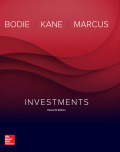
a.
To calculate:The intrinsic value when GE’s P/E ratio starting in 2020 will be 16.
Introduction:
Unlevered Beta: This is also called as asset beta. It is one of the risk measurement unit which is used to compare the risk of company that doesnot have any debts with that of risk of the markets. In other words, risk of the company without dedts and risk of the market is compared.
a.
Answer to Problem 16PS
The intrinsic value when P/E ratio in the year 2020 is 16 will be $111868 and of FCFE will be $77595.80.
Explanation of Solution
Given information:
Spreadsheet 18.2 −
| 2016 | 2017 | 2018 | 2019 | 2020 | ||
| A.Input data | ||||||
| P/E | 14.35 | 14.25 | 14.17 | 14.08 | 14 | |
| Cap spending'shr | 2.65 | 2.7 | 2.82 | 2.93 | 3.05 | |
| LT Debt | 30000 | 28500 | 27333 | 26167 | 25000 | |
| Shares | 1800 | 1800 | 1798 | 1797 | 1795 | |
| EPS | 3.1 | 3.75 | 3.83 | 3.92 | 4 | |
| Working capital | 36825 | 37750 | 41173 | 44597 | 48020 | |
| Discount rate calculations | ||||||
| Current beta | 0.95 | |||||
| unlevered beta | 0.767 | |||||
| terminal growth | 0.02 | |||||
| tax_rate | 0.35 | |||||
| r.debt | 0.036 | |||||
| risk-free rate | 0.02 | |||||
| market risk premium | 0.08 |
The formulas to be entered in the cells are as follows:
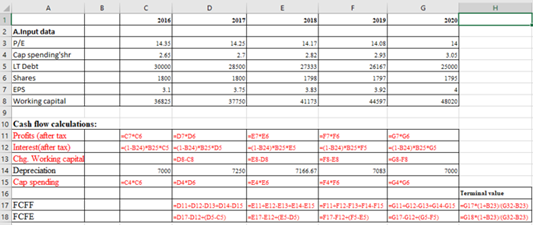
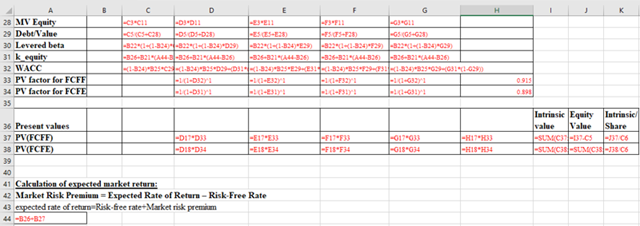
After inputing the required value in the cell related to G3, we get the following values.
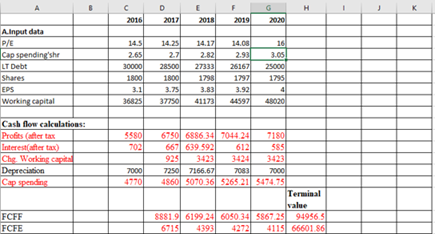
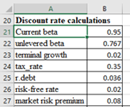
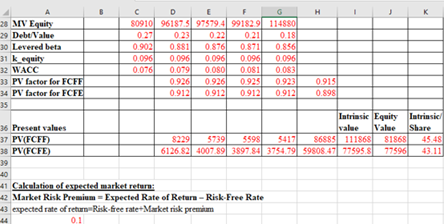
Therefore the intrinsic value when P/E ratio in the year 2020 is 16 will be $111868 and of FCFE will be $77595.80
b.
To calculate: The intrinsic value when GE’s unlevered beta is 0.80.
Introduction:
Unlevered Beta: This is also called as asset beta. It is one of the risk measurement unit which is used to compare the risk of company that doesnot have any debts with that of risk of the markets. In other words, risk of the company without dedts and risk of the market is compared.
b.
Answer to Problem 16PS
The intrinsic value of FCFF is $113972 and FCFE is $79038.50.
Explanation of Solution
Given information:
Spreadsheet 18.2 − Free cash flow model
| 2016 | 2017 | 2018 | 2019 | 2020 | ||
| A.Input data | ||||||
| P/E | 14.35 | 14.25 | 14.17 | 14.08 | 14 | |
| Cap spending'shr | 2.65 | 2.7 | 2.82 | 2.93 | 3.05 | |
| LT Debt | 30000 | 28500 | 27333 | 26167 | 25000 | |
| Shares | 1800 | 1800 | 1798 | 1797 | 1795 | |
| EPS | 3.1 | 3.75 | 3.83 | 3.92 | 4 | |
| Working capital | 36825 | 37750 | 41173 | 44597 | 48020 | |
| Discount rate calculations | ||||||
| Current beta | 0.95 | |||||
| unlevered beta | 0.767 | |||||
| terminal growth | 0.02 | |||||
| tax_rate | 0.35 | |||||
| r.debt | 0.036 | |||||
| risk-free rate | 0.02 | |||||
| market risk premium | 0.08 |
The formulas to be entered in the cells are as follows:
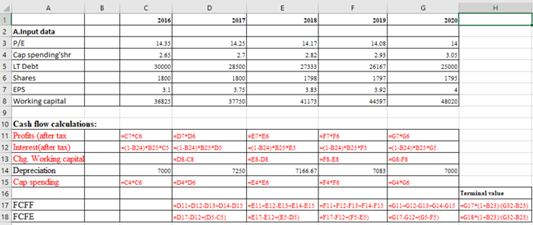
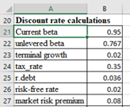
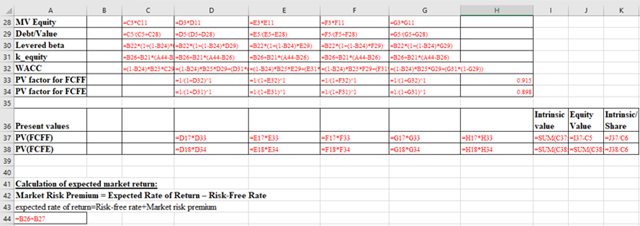
We need to change the vaue of unlevered beta from 0.767 to 0.80. After inputing the required value in the cell related to B22, we get the following values.
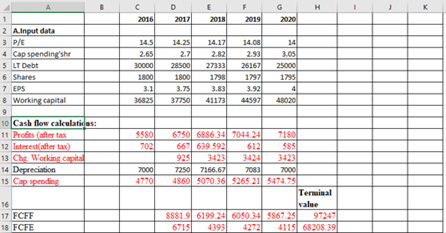
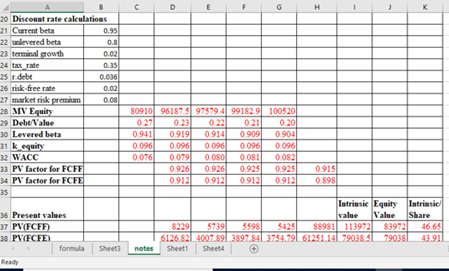
Therefore, the intrinsic value of FCFF is $113972 and FCFE is $79038.50.
c.
To calculate: Intrinsic value when the market risk premium is 7.5%
Introduction:
Unlevered Beta: This is also called as asset beta. It is one of the risk measurement unit which is used to compare the risk of company that doesnot have any debts with that of risk of the markets. In other words, risk of the company without dedts and risk of the market is compared.
c.
Answer to Problem 16PS
The intrinsic value of FCFF will be$ 119921 and for FCFE it will be $83151.40.
Explanation of Solution
Given information:
Spreadsheet 18.2 − Free cash flow model
| 2016 | 2017 | 2018 | 2019 | 2020 | ||
| A.Input data | ||||||
| P/E | 14.35 | 14.25 | 14.17 | 14.08 | 14 | |
| Cap spending'shr | 2.65 | 2.7 | 2.82 | 2.93 | 3.05 | |
| LT Debt | 30000 | 28500 | 27333 | 26167 | 25000 | |
| Shares | 1800 | 1800 | 1798 | 1797 | 1795 | |
| EPS | 3.1 | 3.75 | 3.83 | 3.92 | 4 | |
| Working capital | 36825 | 37750 | 41173 | 44597 | 48020 | |
| Discount rate calculations | ||||||
| Current beta | 0.95 | |||||
| unlevered beta | 0.767 | |||||
| terminal growth | 0.02 | |||||
| tax_rate | 0.35 | |||||
| r.debt | 0.036 | |||||
| risk-free rate | 0.02 | |||||
| market risk premium | 0.08 |
The formulas to be entered in the cells are as follows:
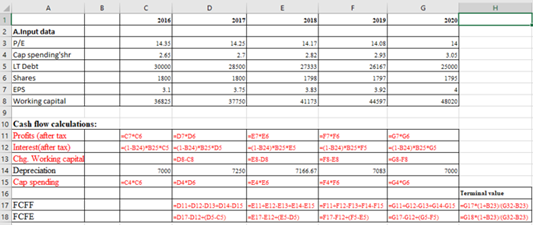
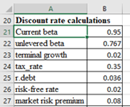
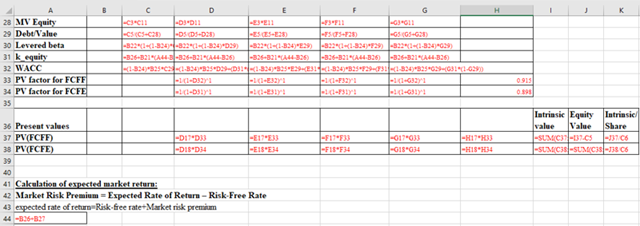
We need to change the vaue of unlevered beta from 0.08 to 0.075. After inputing the required value in the cell related to B27, we get the following values.
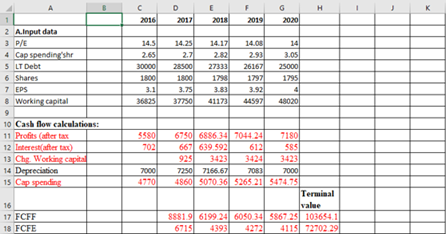
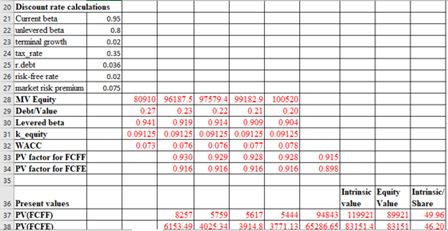
Therefore the intrinsic value of FCFE will be$ 119921 and for FCFE it will be $83151.40.
Want to see more full solutions like this?
Chapter 18 Solutions
EBK INVESTMENTS
- no ai do not answer this question if data is not clear or image is blurr. please comment i will write values . but do not amswer with unclear values. i will give unhelpful.arrow_forwardno ai Image is blurr do not answer this question if data is not clear or image is blurr. please comment i will write values but do not amswer with unclear values. i will give unhelpful sure.arrow_forwardDon't solve this question with unclear data. i will give unhelpful rating . please skip this qnarrow_forward
- The prodave paint company earned a net profit margin of 20% on revenues of $20m this year. Fixed Capital Investment was $2 m and depreciation was $3 m. Working capital Investment equals 7.5% of the Sales level in that year. Net income, fixed Capital Investment, depreciation, interest expenses and sales are expected to grow at 10% per year for the next 5 years. After 5 years, the growth in sales , net income, depreciation and interest expenses will decline to a stable 5% per year and fixed Capital Investment and depreciation will offset each other. The tax rate is 40% and the prodave has 1 m shares of common stock outstanding and long term debt paying 12.5% interest trading at it's par value of $32 m. The WACC is 17% during the high growth stage and 15% during the stable growth stage. Required: a) Calculate FCFE b) Determine FCFF c) Estimate the value of Equity d) Calculate the value of the Firmarrow_forwardA key dynamic within any Multi-National Corporation (MNC) is cash and foreign exchange risk exposure. Cash management is critical and also heavily influenced by global dynamics, especially since COVID-19. Within the Caribbean and North American jurisdiction, the economic framework is tightly connected with the major Asian economies of China, the United Kingdom and Japan. The Caribbean and the North American economy have been a barometer of the global economic cycle.) For both Caribbean and North American economies, many Multi-National Corporations have made significant investments to reduce the production cost of goods and diversification benefits. Despite the benefits that could materialize, some North American countries have not been resilient through Global market shocks. Given this context, the following questions require research within the Caribbean context and current market dynamics since COVID-19. Your Manager has asked you to address the following concerns in the report 1)…arrow_forwardA key dynamic within any Multi-National Corporation (MNC) is cash and foreign exchange risk exposure. Cash management is critical and also heavily influenced by global dynamics, especially since COVID-19. Within the Caribbean and North American jurisdiction, the economic framework is tightly connected with the major Asian economies of China, the United Kingdom and Japan. The Caribbean and the North American economy have been a barometer of the global economic cycle.) For both Caribbean and North American economies, many Multi-National Corporations have made significant investments to reduce the production cost of goods and diversification benefits. Despite the benefits that could materialize, some North American countries have not been resilient through Global market shocks. Given this context, the following questions require research within the Caribbean context and current market dynamics since COVID-19. Your Manager has asked you to address the following concerns in the report 1)…arrow_forward
- A key dynamic within any Multi-National Corporation (MNC) is cash and foreign exchange risk exposure. Cash management is critical and also heavily influenced by global dynamics, especially since COVID-19. Within the Caribbean and North American jurisdiction, the economic framework is tightly connected with the major Asian economies of China, the United Kingdom and Japan. The Caribbean and the North American economy have been a barometer of the global economic cycle.) For both Caribbean and North American economies, many Multi-National Corporations have made significant investments to reduce the production cost of goods and diversification benefits. Despite the benefits that could materialize, some North American countries have not been resilient through Global market shocks. Given this context, the following questions require research within the Caribbean context and current market dynamics since COVID-19. Your Manager has asked you to address the following concerns in the report 1)…arrow_forwardJeff Krause purchased 1,000 shares of a speculative stock in January for $1.89 per share. Six months later, he sold them for $9.95 per share. He uses an online broker that charges him $10.00 per trade. What was Jeff's annualized HPR on this investment? Jeff's annualized HPR on this investment is %. (Round to the nearest whole percent.)arrow_forwardCongratulations! Your portfolio returned 16.7% last year, 2.5% better than the market return of 14.2%. Your portfolio had a standard deviation of earnings equal to 18%, and the risk-free rate is equal to 4.4%. Calculate Sharpe's measure for your portfolio. If the market's Sharpe's measure is 0.29, did you do better or worse than the market from a risk/return perspective? The Sharpe's measure of your portfolio is (Round to two decimal places.)arrow_forward
- On January 1, 2020, Simon Love's portfolio of 15 common stocks had a market value of $258,000. At the end of May 2020, Simon sold one of the stocks, which had a beginning-of-year value of $26,900, for $31,400. He did not reinvest those or any other funds in the portfolio during the year. He received total dividends from stocks in his portfolio of $11,900 during the year. On December 31, 2020, Simon's portfolio had a market value of $246,000. Find the HPR on Simon's portfolio during the year ended December 31, 2020. (Measure the amount of withdrawn funds at their beginning-of-year value.) Simon's portfolio HPR during the year ended December 31, 2020, is %. (Round to two decimal places.)arrow_forwardChee Chew's portfolio has a beta of 1.27 and earned a return of 13.6% during the year just ended. The risk-free rate is currently 4.6%. The return on the market portfolio during the year just ended was 10.5%. a. Calculate Jensen's measure (Jensen's alpha) for Chee's portfolio for the year just ended. b. Compare the performance of Chee's portfolio found in part a to that of Carri Uhl's portfolio, which has a Jensen's measure of -0.25. Which portfolio performed better? Explain. c. Use your findings in part a to discuss the performance of Chee's portfolio during the period just ended.arrow_forwardDuring the year just ended, Anna Schultz's portfolio, which has a beta of 0.91, earned a return of 8.1%. The risk-free rate is currently 4.1%, and the return on the market portfolio during the year just ended was 9.4%. a. Calculate Treynor's measure for Anna's portfolio for the year just ended. b. Compare the performance of Anna's portfolio found in part a to that of Stacey Quant's portfolio, which has a Treynor's measure of 1.39%. Which portfolio performed better? Explain. c. Calculate Treynor's measure for the market portfolio for the year just ended. d. Use your findings in parts a and c to discuss the performance of Anna's portfolio relative to the market during the year just ended.arrow_forward
 EBK CONTEMPORARY FINANCIAL MANAGEMENTFinanceISBN:9781337514835Author:MOYERPublisher:CENGAGE LEARNING - CONSIGNMENT
EBK CONTEMPORARY FINANCIAL MANAGEMENTFinanceISBN:9781337514835Author:MOYERPublisher:CENGAGE LEARNING - CONSIGNMENT
